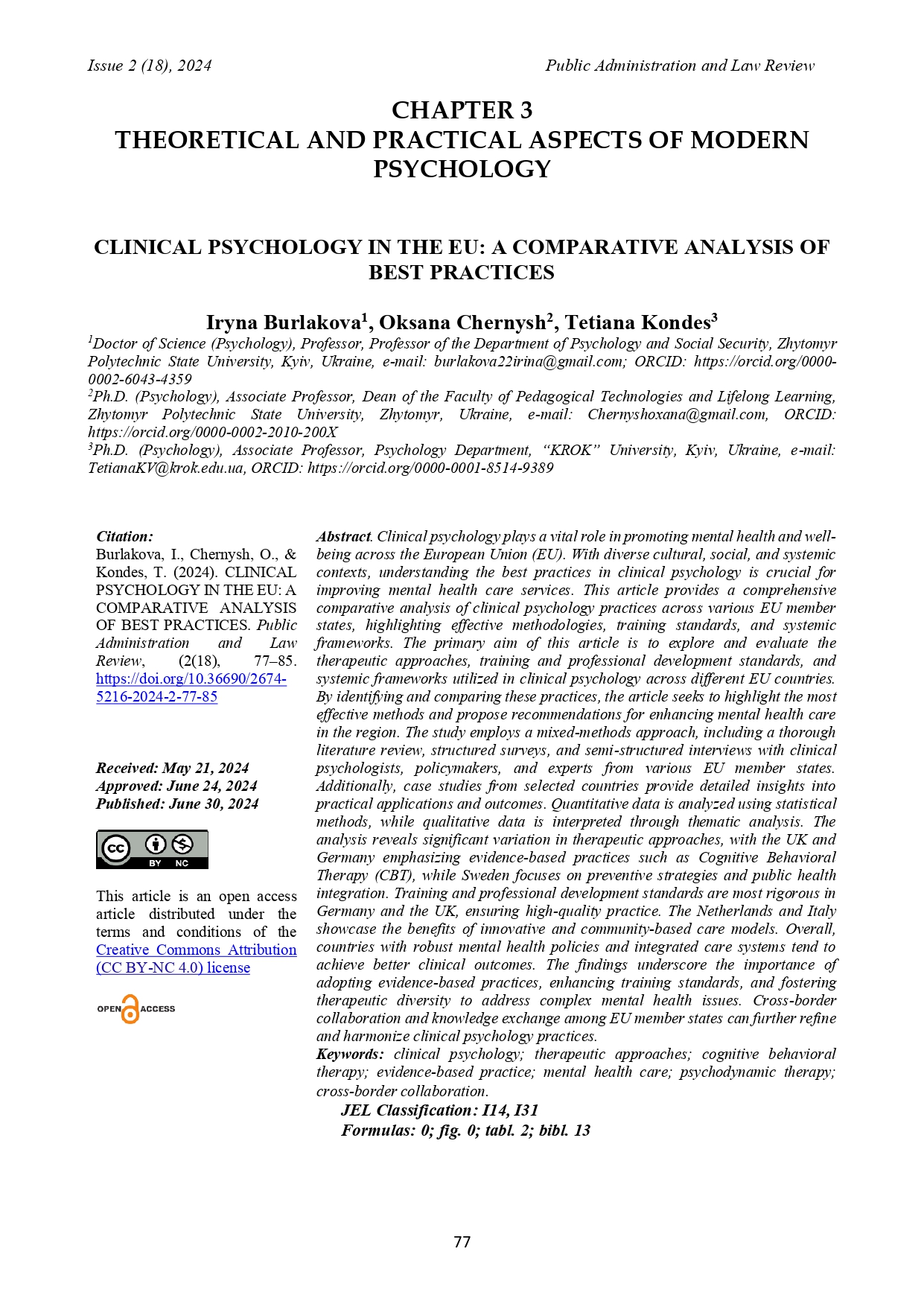CLINICAL PSYCHOLOGY IN THE EU: A COMPARATIVE ANALYSIS OF BEST PRACTICES
DOI:
https://doi.org/10.36690/2674-5216-2024-2-77-85Keywords:
clinical psychology, therapeutic approaches, cognitive behavioral therapy, evidence-based practice, mental health care, psychodynamic therapy, cross-border collaborationAbstract
Clinical psychology plays a vital role in promoting mental health and well-being across the European Union (EU). With diverse cultural, social, and systemic contexts, understanding the best practices in clinical psychology is crucial for improving mental health care services. This article provides a comprehensive comparative analysis of clinical psychology practices across various EU member states, highlighting effective methodologies, training standards, and systemic frameworks. The primary aim of this article is to explore and evaluate the therapeutic approaches, training and professional development standards, and systemic frameworks utilized in clinical psychology across different EU countries. By identifying and comparing these practices, the article seeks to highlight the most effective methods and propose recommendations for enhancing mental health care in the region. The study employs a mixed-methods approach, including a thorough literature review, structured surveys, and semi-structured interviews with clinical psychologists, policymakers, and experts from various EU member states. Additionally, case studies from selected countries provide detailed insights into practical applications and outcomes. Quantitative data is analyzed using statistical methods, while qualitative data is interpreted through thematic analysis. The analysis reveals significant variation in therapeutic approaches, with the UK and Germany emphasizing evidence-based practices such as Cognitive Behavioral Therapy (CBT), while Sweden focuses on preventive strategies and public health integration. Training and professional development standards are most rigorous in Germany and the UK, ensuring high-quality practice. The Netherlands and Italy showcase the benefits of innovative and community-based care models. Overall, countries with robust mental health policies and integrated care systems tend to achieve better clinical outcomes. The findings underscore the importance of adopting evidence-based practices, enhancing training standards, and fostering therapeutic diversity to address complex mental health issues. Cross-border collaboration and knowledge exchange among EU member states can further refine and harmonize clinical psychology practices.
Downloads
References
Barkham, M., Hardy, G. E., & Mellor-Clark, J. (2010). Developing and Delivering Practice-Based Evidence: A Guide for the Psychological Therapies. John Wiley & Sons.
Barlow, D. H. (2014). Clinical Handbook of Psychological Disorders: A Step-by-Step Treatment Manual. Guilford Press.
Burlakova, I.; Kondes, T.; Sheviakov, O. (2020). Cognitive approach to corporate well-being management. International conference on Economics, Accounting and Finance, Estonia, jul. 2020. Available at: https://conf.scnchub.com/index.php/ICEAF/ICEAF/paper/view/82
Burlakova, I., Sheviakov, O., & Kondes, T. (2021). PSYCHOLOGICAL PREDICTORS OF THE FORMATION OF HEALTH-PRESERVING COMPETENTNESS OF FUTURE SPECIALISTS. Public Administration and Law Review, (4), 74–79. https://doi.org/10.36690/2674-5216-2021-4-74
Burlakova, I., Sheviakov, O., Kondes, T., Kornienko, V., Ostapenko, I., & Gerasimchuk, O. (2022). Social and pedagogical aspects of occupational health of specialists. Pedagogy and Education Management Review, (4), 38–43. https://doi.org/10.36690/2733-2039-2022-4-38.
Cooper, M. (2012). Essential Research Findings in Counselling and Psychotherapy: The Facts Are Friendly. SAGE Publications.
Evers, G., Lucassen, P., & Verhoeven, C. (2016). Psychotherapeutic Approaches in Europe: Integration and Adaptation. Routledge.
Huppert, F. A., Keverne, B., & Baylis, N. (2018). The Science of Well-being: Integrating Neurobiology, Psychology, and Social Science. Oxford University Press.
Kazantzis, N., Whittington, C., & Dattilio, F. M. (2010). The Use of Homework Assignments in Cognitive Behavior Therapy: Working with Complex Cases. Springer.
Lambert, M. J. (2013). Bergin and Garfield's Handbook of Psychotherapy and Behavior Change. John Wiley & Sons.
Lunt, I., Bartram, D., & Day, E. (2012). Standards for Educational and Psychological Testing in Europe. European Federation of Psychologists' Associations.
Norcross, J. C., & Lambert, M. J. (2018). Psychotherapy Relationships That Work: Volume 1: Evidence-Based Therapist Contributions. Oxford University Press.
Wampold, B. E., & Imel, Z. E. (2015). The Great Psychotherapy Debate: The Evidence for What Makes Psychotherapy Work. Routledge.

Downloads
Published
How to Cite
Issue
Section
License

This work is licensed under a Creative Commons Attribution-NoDerivatives 4.0 International License.





